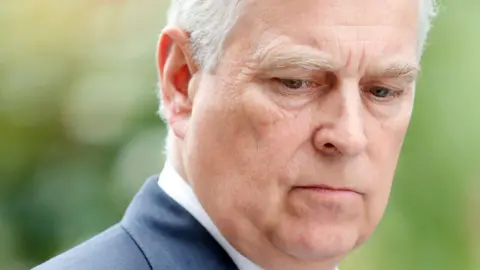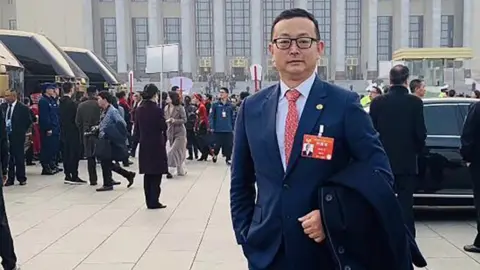Secret papers reveal new details about Andrew's ties to Chinese 'spy'
 Getty Images
Getty ImagesPrince Andrew's involvement with an alleged Chinese spy came at a time his chief aide and other royals believed his reputation was "irrecoverable".
Previously secret documents detail how ex-advisor Dominic Hampshire saw Yang Tengbo as Andrew's "only light at the end of the tunnel" after his Newsnight interview in 2019.
The documents also reveal details of Andrew's "communication channel" with China's President Xi Jinping - including sending an annual birthday letter - and how MI5 intervened to warn against Andrew having contact with the alleged spy.
The documents were disclosed after the BBC and other media outlets pushed for them to be released by the courts.
Mr Yang has denied all wrongdoing.
Newly released papers include Mr Hampshire's full witness statement, which he wrote in support of Mr Yang and sought to keep private.
It sheds new light on links between the royal and alleged spy, who became a close advisor on Andrew's business ventures. The document also reveals:
- Mr Hampshire believed there were "leaks everywhere at all sorts of levels" in the Royal Household that made it difficult to keep Andrew's plans private
- Andrew's activities were discussed at two meetings between King Charles, the duke and Mr Hampshire - for which Andrew was smuggled into Windsor Castle to avoid press attention
- There was tension among aides advising Andrew, which led to his private secretary being excluded from some meetings regarding the duke's business plans
Birthday cards for Xi
Mr Hampshire's statement details how Andrew believed that, with the help of Mr Yang, he could salvage a prominent public position by pursuing business opportunities in China - even though, as his aide acknowledged, ties to Beijing are "not a good look anywhere or for anyone".
Andrew had a "communication channel" with the Chinese president, the document reveals, which Mr Hampshire said was largely used to promote his Pitch@Palace start-up business initiative in China.
He said that because of "cultural differences", Mr Yang helped him draft letters to Xi, including in relation to plans for the Eurasia Fund, an investment vehicle which Andrew was seeking to raise money for.
In a separate document released on Friday, Mr Yang confirmed he personally pitched the fund to Xi and the wider Chinese government.
 China Daily
China DailyMr Hampshire said in his witness statement that there was "nothing to hide" in the exchanges between Andrew and Xi – and they were full of "top-level nothingness", such as birthday wishes.
Mr Hampshire said the late Queen Elizabeth II knew about the contacts with China and they were "perhaps even encouraged".
He described Andrew as a "valuable communication point with China" - though the document reveals that Mr Hampshire thought "China would prefer a different royal".
After the papers were released on Friday, Buckingham Palace emphasised the King had no connection with Mr Yang.
The alleged spy was not "mentioned at any time or in any way" in meetings with Andrew, the Palace said, and there was no approval given for any business relationships with him.
Concerns over isolated Andrew
These latest revelations show how much Andrew had become an isolated figure after his disastrous 2019 BBC Newsnight interview - as well as the palace intrigue surrounding his attempts to recover his position.
The fallout from the interview led the prince to withdraw from public duties and led to the end of Pitch@Palace events in the UK and China, a scheme widely seen as one of Andrew's more successful ventures.
Mr Yang had lived in the UK since 2002 and became a trusted confidant to Andrew in the wake of the interview.
Commenting on the mood in the Palace after the interview, which saw him questioned over his friendship with convicted sex offender Jeffrey Epstein, Mr Hampshire said it was "clear" the duke's "reputation was irrecoverable".
The documents show how as Andrew's public status fell, Mr Yang's role as a potential bridge to business opportunities in China grew in its importance.
Separately, Mr Hampshire also reflected on his worries about people trying to ingratiate themselves with Andrew "in order to make excessive money out the Duke or their association with him".
In December, the Special Immigration Appeals Commission (Siac) said Mr Yang had formed an "unusual degree of trust" with Andrew.
It found Mr Yang had not disclosed his links to an arm of the Chinese Communist Party (CCP) which is involved in clandestine "political interference".
That term is used for suspected Chinese state agents who use their position to secretly influence key decision-makers in the British state, including politicians, academics and business leaders.
These agents aim to subtly and slowly make key figures amenable to the aims of the CCP in a long-term operation often referred to as "elite capture".
It was previously revealed Mr Hampshire credited Mr Yang with salvaging Andrew's reputation in China.
